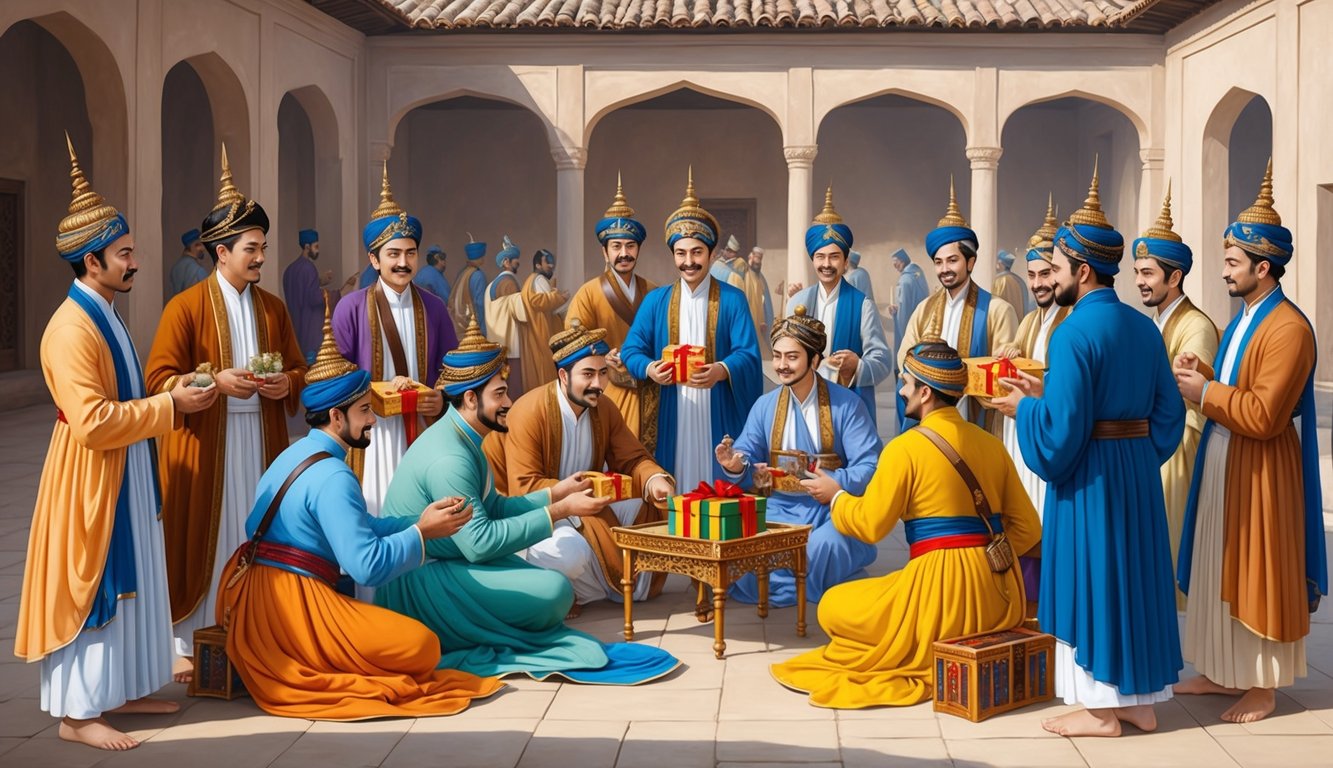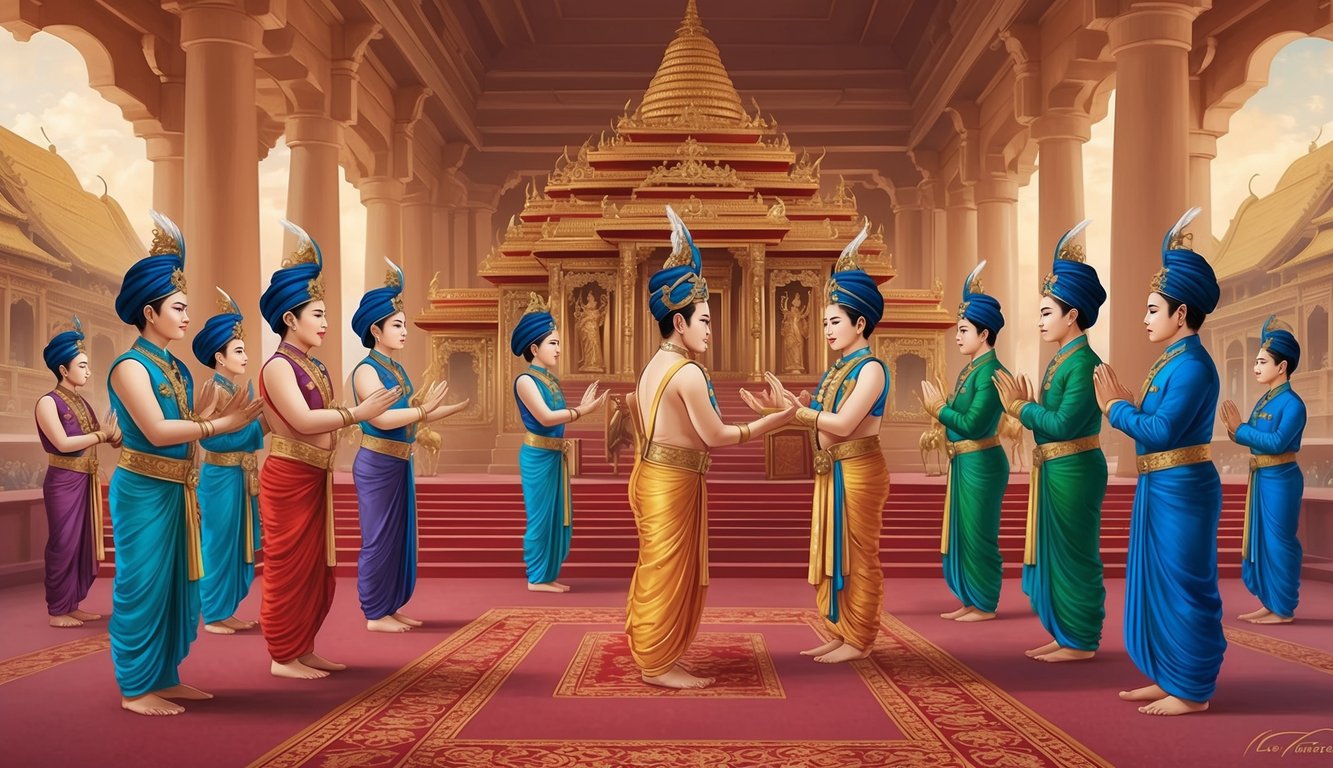Don’t Miss Out On This Unique Astrological Opportunity
Are you tired of spinning your wheels and getting nowhere? Simply put, you’re out of sync: you’re out of alignment with your astral configuration.
But: there’s a kind of map that can help you reclaim your alignment. Think of it as your own personal blueprint to success and happiness: a blueprint that will help you live your most amazing life.
Get started here.
The Bible is full of fascinating characters, and among them are the eunuchs, who appear in both the Old and New Testaments.
You might be wondering what role these figures play in scripture and why they’re significant. In the Bible, eunuchs are portrayed as both literal individuals who served in royal courts and as symbols representing those who choose to dedicate themselves to God.
Your journey in understanding these figures begins with the Old Testament, where eunuchs often held high positions and were entrusted by kings.
For example, the Ethiopian eunuch is a well-known story where this figure encounters Philip, leading to a moment of conversion and baptism.
Such stories highlight their unexpected and pivotal roles in biblical narratives.
The New Testament also sheds light on eunuchs through Jesus’ words about those who become eunuchs for the kingdom of heaven.
This message stresses the importance of spiritual commitment and self-sacrifice.
When you explore the biblical references, you’ll find that eunuchs challenge traditional views, pushing you to think more deeply about identity and devotion.
Historical Context of Eunuchs in the Bible
Eunuchs in the Bible held unique roles in various societies.
From working in royal harems to being trusted advisors, they served many critical functions.
You’ll also find mentions of eunuchs in biblical texts, reflecting diverse views and interpretations.
Roles and Duties in Ancient Societies
Eunuchs often held significant positions within ancient cultures.
In the Bible’s Old Testament, eunuchs were commonly associated with roles like chamberlains in royal courts, especially in Assyrian and Babylonian empires.
They often managed the private quarters of royalty, including the harem.
These men were trusted due to their status as eunuchs, perceived as loyal and less likely to pursue personal power.
This reliance extended to other areas, like handling sensitive diplomatic missions or acting as messengers between kingdoms.
In these capacities, eunuchs could wield considerable influence.
Eunuchs Across Different Cultures
Different cultures, including Hebrew, Greek, and Roman, had varied perspectives on eunuchs.
In Greek and Roman societies, eunuchs were often seen as servants or guards, but their roles could vary significantly.
In the Roman Empire, some rose to high positions of power, even in politics.
In Hebrew culture, the term “saris” was used to describe eunuchs.
This term appears in the Bible, referencing different roles they played.
The Assyrians and Babylonians, too, employed eunuchs primarily for administrative or protective duties within royal households.
Each culture assigned varying degrees of social status to eunuchs, from respected to marginal.
Scriptural References and Interpretations
The Bible mentions eunuchs multiple times.
In Christian texts, like the New Testament, eunuchs are portrayed positively in passages such as Acts 8:26-40, discussing the Ethiopian eunuch’s conversion.
Such accounts highlight a focus on faith and devotion rather than physical status.
In the Old Testament, references to eunuchs, including the Hebrew term “saris” and the Greek “eunouchos,” often align with their historical roles in society, such as serving as officials or guards.
Biblical texts sometimes associate eunuchs with concepts of servitude and dedication.
Interpretations can vary, but these scriptures provide insights into their historical and spiritual significance.
Eunuchs in Key Biblical Narratives
Eunuchs appear in several important biblical stories, each highlighting different roles they played.
From their connection to powerful figures to their unique societal positions, eunuchs served in diverse capacities across key narratives.
The Story of Esther and Hegai
In the Book of Esther, Hegai is a eunuch who plays an important role in Queen Esther’s life.
He is in charge of the harem where Esther resides, a position of significant trust and responsibility.
Hegai assists Esther in preparing for her audience with the king, showcasing the trust and influence eunuchs could wield.
His actions were pivotal in Esther gaining favor, helping her rise to a position where she could protect her people.
The story emphasizes the strategic roles eunuchs often had in royal courts, acting as trusted advisors and gatekeepers to considerable power.
The Ethiopian Eunuch and Philip
The Ethiopian eunuch is a notable figure in the Book of Acts.
He was an official, in charge of the treasury for the Queen of the Ethiopians, and encountered Philip during a journey.
Sitting in his chariot, he read from Isaiah when Philip approached him.
Their conversation led to the Ethiopian eunuch’s baptism, marking a significant moment in spreading Christianity beyond Jewish communities.
His baptism by Philip represents a moment of inclusion, showing that the message of the gospel was intended for all, regardless of ethnicity or social status.
This story underlines the theme of divine guidance and the spreading of faith as a universal message.
Daniel and His Companions
In the Book of Daniel, while it may not explicitly state that Daniel and his companions were eunuchs, they are often associated with the personnel serving in the Babylonian court.
This includes roles typically reserved for eunuchs, involving close service to the king.
Daniel and his friends were chosen for their wisdom and skills, set apart by their diet, and adherence to their faith.
Their story demonstrates bravery and faithfulness, illustrating how they maintained their beliefs even in foreign courts.
Their prominence in a land not their own reflects how individuals, possibly in positions similar to eunuchs, could navigate and influence even the highest levels of foreign powers.
Theological Significance of Eunuchs

Eunuchs have a unique place in biblical texts, highlighting themes of celibacy, sexuality, and inclusion within Christianity.
From Jesus’s teachings to promises found in Isaiah, these references offer deeper insights into religious doctrine and belief.
Jesus’s Teachings on Eunuchism
In the Gospel of Matthew, Jesus discusses different kinds of eunuchs.
You’re introduced to those born as eunuchs, those made eunuchs by others, and those who choose to live like eunuchs for the Kingdom of Heaven.
In Matthew 19:12, Jesus emphasizes that the choice to live a celibate life, like a eunuch, can be an act of devotion.
This teaching speaks to how sexuality and marriage are approached in Christianity, suggesting that celibacy is a valid and honored path for some believers.
This idea underscores a commitment to spiritual life over earthly desires.
Eunuchs and the Kingdom of Heaven
The notion that eunuchs can have a place in the Kingdom of Heaven is a radical one.
Jesus suggests that those who choose celibacy to serve God align closely with spiritual ideals.
This choice, seen as a sacrifice, reflects deeply on personal holiness and dedication.
By choosing this path, you’re focusing on spiritual growth.
The inclusion of eunuchs highlights the diverse ways one can serve God and enter Heaven.
This also challenges social norms about sexuality and marriage, offering a more expansive view of spiritual and personal fulfillment.
Promises in Isaiah to Eunuchs
Isaiah 56:3-5 provides significant comfort and hope for eunuchs in the Bible.
The passage promises that eunuchs who follow God’s ways will receive a name better than sons and daughters—a lasting legacy within God’s house.
This promise is significant because it offers an eternal promise and a comforting assurance of inclusion and honor in the eyes of God.
For those who may have felt marginalized or forgotten, this is a powerful message of acceptance.
Through Isaiah, it becomes clear that their devotion and faithfulness are recognized and rewarded by God, reminding you that spiritual commitment transcends earthly status.
This message aligns with the broader biblical theme of God’s unwavering love and faithfulness toward those who wholeheartedly follow Him.
Just as Isaiah 43 explained God’s promise to be with His people through trials, Isaiah 56 reassures eunuchs that their dedication is seen and valued.
This reinforces the idea that God’s blessings are not limited by societal status but are given to those who remain faithful to Him.
Eunuchs and Their Social Identity

Throughout biblical history, eunuchs played varied roles, both distinctive and significant.
They often found themselves crossing the boundaries of gender roles and social acceptance.
The Bible presents their unique identities and their involvement in religious life, offering insights into how they navigated societal norms and religious expectations.
Eunuchs and Gender Roles
Eunuchs often held unique positions when it came to gender roles.
In many cases, their status was due to castration, which altered their roles within society.
Some eunuchs were voluntarily committed, while others were forced eunuchs.
There were also those referred to as natural eunuchs, either born that way or choosing a celibate life.
Biblical texts sometimes portray eunuchs as outside the typical male-female binary.
For example, in Matthew 19:12, Jesus refers to different types of eunuchs, highlighting their distinct societal position.
This challenged traditional gender norms, and eunuchs often found themselves bridging roles in ways others couldn’t. Their identities were not fixed, showing the complexity of gender roles within biblical contexts, an idea that is still relevant today.
Acceptance and Exclusion in Religious Texts
The Bible contains passages that both accept and exclude eunuchs from religious life.
In Deuteronomy 23:1, certain restrictions are placed on eunuchs entering the assembly of the Lord.
This reflects the tension between acceptance and exclusion, often dependent on the cultural setting of the time.
Isaiah 56:3-5 offers a more inclusive view, where eunuchs are promised a place and a name within God’s house.
This contrast illustrates the evolving perception of eunuchs in religious texts.
While some passages provide boundaries, others highlight the inclusive message, indicating a nuanced understanding of eunuchs in the biblical era.
Inclusion of Eunuchs in Worship
Despite facing exclusion, eunuchs were often included in worship and religious duties.
In Acts 8:26-40, an Ethiopian eunuch is baptized, symbolizing the acceptance and spiritual inclusion that transcend societal restrictions.
This narrative showcases the importance of their role and the diversity within early Christian communities.
Eunuchs contributed significantly to religious activities, holding responsibilities in temples and among leadership ranks.
This inclusion affirms their valued position and spiritual equality, despite societal views that might have suggested otherwise.
Their ability to occupy these spaces highlights a broader interpretation of inclusion and service in biblical contexts.
Ceremonial Practices and Eunuchs

In the Bible, eunuchs held various roles and participated in significant religious and ceremonial events.
Two key stories involve the Ethiopian eunuch’s conversion and baptism as well as the prophetic symbolism associated with eunuchs.
Ethiopian Eunuch’s Conversion and Baptism
The story of the Ethiopian eunuch, an officer of the queen of the Ethiopians, highlights an important moment in early Christianity.
While traveling, the eunuch was reading from the prophet Isaiah, specifically about a lamb led to the slaughter, which symbolizes justice and sacrifice.
Philip, an evangelist, helped him understand the scriptures.
The passage they discussed was key to his conversion, emphasizing the good news about Jesus.
When they came to water, the eunuch expressed his desire to be baptized.
This moment shows the spirit of inclusivity and acceptance in Christianity.
Baptism marked his embrace of faith, highlighting transformation and spiritual growth.
Prophetic Symbolism and Eunuchs
In biblical texts, eunuchs often represented individuals useful in serving important functions in society and religion.
They served as servants of God, and their unique status holds prophetic symbolism in Isaiah.
The prophet promised eunuchs who upheld the covenant a place in God’s house and a name better than sons and daughters, ensuring they would not be forgotten among the descendants of Israel.
The Hebrew word for eunuch suggests a wider role beyond physical status, pointing to their spiritual significance.
This inclusion reflects a commitment to justice and equality, offering eunuchs a meaningful legacy in the faith community.



